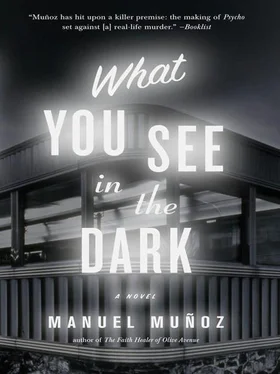The sky readied itself for day in the east. Arlene cleared the steps carefully, making her way to the diesel truck. The December morning clipped her with a sharp chill, her breath in the air. The dog sensed her even before she had taken a few steps, but she kept her resolve. She would move forward. There was only forward.
From the road came the familiar sound of tires, of a car slowing down. As she looked to the road, the police car rolled into view, and she stopped. The dog barked madly and she heard the driver call out, “Buddy!” in a tired voice, then again when the dog raised its paws to the window. The police car slowed down and she could see in the coming clarity that there were two officers inside. They parked the car and she felt her hands go numb. “Buddy!” the driver yelled, and she could hear him rising up in the cab. She wanted to keep going, but the distance was too great, too long, the simple path into the storybook forest too dark, too dark. She felt her hands give up and drop the tray as the officers opened the doors to the patrol car, the food spilling all over the gravel, the plates shattering, the coffee carafe tumbling. Arlene looked at the truck driver’s breakfast and then at the two officers approaching and she collapsed to her knees, weeping. She wept hard. She held her face in her hands and the morning was cold and she wanted to go back inside to the safety of her little house with the warm yellow windows.
“Mrs. Watson?” said one of the officers, approaching her. He came in to the café every day, just past the lunch hour, and ordered a grilled cheese, home fries, and a cola. “Mrs. Watson?” he called one more time, his boots on the gravel. He came closer, closer. Then he put his hands on her shoulders and bent down to her. “Arlene?”
When she entered that room, she thought the difficult moment would be the instant she loosened the robe and let it fall from her shoulders, all eyes on her, and already the need to start acting, to move with a nonchalance about her own body, taking off the robe without it appearing sensual. But when you remove a robe, you remove a robe. There’s no hiding nakedness. The moment she took off the robe, she could feel all the eyes in the room averted, and no one witnessing how she handed the robe like a coat to the wardrobe mistress. The eyes averted, but sooner or later they looked at her. She wasn’t naked: she wore bikini briefs, and her breasts were mostly covered with a flesh-colored moleskin fitted and glued painstakingly by the costume designer, intended to make her look naked with the proper camera angle, no worry about straps being inadvertently caught on film, or even the pinch of flesh caused by fabric bunching up with the tiniest wrong move. She wasn’t naked, but all eyes settled on her because she was the one being filmed, with a proximity of cameras and lighting that she had underestimated.
Their brief scouting trip, back in October, had failed to bring them even the road shots showing the Actress driving her car: they had to shoot those later on a soundstage and add the voice-overs in the editing. Production began after the October trip, straight weeks of tight, rushed work all through the fall. Some of the sequences that involved no actors — like long shots of the Phoenix skyline, or a rear projection of a police car driving along a stretch of desert highway — were completed by an unsupervised second unit, the Director specifying exactly what needed to show up on film. But not this scene: the desire for order was keener, the Director sitting the Actress down and showing her how the sequence was going to be staged and filmed, a barrage of particular shots, each of them choreographed with a precision the Actress found almost daunting in its exactitude. The Director mapped out each shot on board after board, and she could see for herself how he was planning to get around the problem of her nakedness: the trust that the camera would shoot only the particular part of the body he was asking for and nothing else. Her torso, her thighs, her shoulders, the curve of her bare back.
The Actress had studied the sequence carefully. The Director clarified once again the number of camera setups, the lighting changes, even the position of the crew. Already it occurred to her that it would take an enormous amount of time between setups: a glitch in the opening, once her hair was already wet, would require the hairdresser’s blow-dryer at the very least. She flipped through the storyboards with a measured, silent alarm, moving past the issue of having to disrobe in front of the crew: she was going to have to be in that state continuously, always reaching for cover whenever the camera stopped rolling.
Last week, there’d been difficulties with the initial set design, a plumbing flaw with the drain and a lack of warm water, clearly frustrating the Director, and it was then that she understood just how attuned he was planning to be to the specificity of his mind’s eye, and she thought — of all things — of a painter setting a bowl of fruit on a sunlit windowsill, sketching quickly to catch the shadow of pear against orange, the shallow depth of the bowl, before the sun interrupted the composition.
How fleeting it would all be. She removed her robe and waited for the first of the difficult shots involving water: unwrapping the bar of soap and turning on the showerhead. There she is, finally admitting to her wrongdoing in her own mind, and she’s rinsing all of the bad thoughts away. This was what she was meant to convey, but the Actress stared at the unwrapped bar of soap sitting on the edge of the tub, doubting if she could ascribe that much meaning to such a banal act. It seemed ludicrous to her now, standing in her moleskin covering and bikini bottom, to be acting, almost impossible, given the number of eyes on her. More and more, the Director had told her, mentioning Europe and its realism, the shedding of the American style of artifice, and the ever-closer tilt to the vulgarity of everyday life. Goose pimples broke out on her arms when she thought of the water, praying it would come out warm.
The action started and she stepped into the tub with complete faith, the way she would enter an elevator in a tall building and trust the cables to bring her safely down the heights. The camera was positioned just below where the showerhead would be. She pulled back the curtain and bent down to pick up the soap from the ledge, unwrapping it carefully, trying not to be distracted by the microphone near her hands, off camera, capturing the sound of the paper. All eyes were on the task at hand, but still she felt their intrusion, the many hours she would be standing like this in front of them. She turned on the water, a small, almost involuntary grimace as it poured out, a little chilly but not especially cold, and she let it run on her face for as long as she could before the Director called cut, her hands immediately reaching out for a towel, the wardrobe mistress ready with a dry robe in her hand.
All that for a mere couple of seconds of film at best. She sat to wait as the back breakaway wall of the shower stall was removed from its sturdy hinges by the grips. The Actress asked for a towel to dry her hair, but the wardrobe mistress shook her head, the next shot appearing imminent. The camera was repositioned where the back wall had once been, as if looking out to the bathroom door, and when it became clear that the shot setup was going to take some time, the wardrobe mistress finally produced a towel and let out a sigh, the look on her face that of a noticeable need for a cigarette.
The Actress waited, listening to the proceedings and trying to stay alert to help the Director move quickly if he called her to her spot. She saw what they were busy arranging: the camera would face the bathroom door, so it was a matter of light and shadow, not just the blinding surface of a shower wall. The set decorators were on hand with a batch of shower curtains of varying opacity. The curtain was pulled to and fro as the lights waxed and dimmed, the Director shaking his head at what he could and could not see. He called out to her. “I just need to see you in this spot here,” he said, pointing, and she rose from her seat, her back hurting already from not even a half morning of doing nothing but waiting. She stood in her spot as directed, her warm robe pulled around, the men arguing over the finer shadings of her light.
Читать дальше












